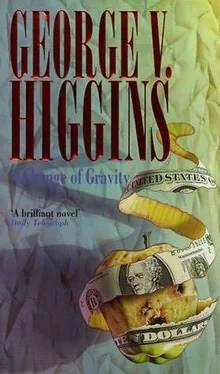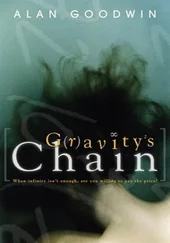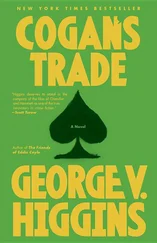George Higgins - A change of gravity
Здесь есть возможность читать онлайн «George Higgins - A change of gravity» весь текст электронной книги совершенно бесплатно (целиком полную версию без сокращений). В некоторых случаях можно слушать аудио, скачать через торрент в формате fb2 и присутствует краткое содержание. Жанр: Криминальный детектив, на английском языке. Описание произведения, (предисловие) а так же отзывы посетителей доступны на портале библиотеки ЛибКат.
- Название:A change of gravity
- Автор:
- Жанр:
- Год:неизвестен
- ISBN:нет данных
- Рейтинг книги:5 / 5. Голосов: 1
-
Избранное:Добавить в избранное
- Отзывы:
-
Ваша оценка:
- 100
- 1
- 2
- 3
- 4
- 5
A change of gravity: краткое содержание, описание и аннотация
Предлагаем к чтению аннотацию, описание, краткое содержание или предисловие (зависит от того, что написал сам автор книги «A change of gravity»). Если вы не нашли необходимую информацию о книге — напишите в комментариях, мы постараемся отыскать её.
A change of gravity — читать онлайн бесплатно полную книгу (весь текст) целиком
Ниже представлен текст книги, разбитый по страницам. Система сохранения места последней прочитанной страницы, позволяет с удобством читать онлайн бесплатно книгу «A change of gravity», без необходимости каждый раз заново искать на чём Вы остановились. Поставьте закладку, и сможете в любой момент перейти на страницу, на которой закончили чтение.
Интервал:
Закладка:
George V Higgins
A change of gravity
ONE
On the afternoon of the second Thursday in November, US District Court Judge Barrie Foote as she preferred ate her lunch alone, reading her New York Times. She sat at the head of the long polished mahogany table in the library of her chambers in the courthouse on Main Street in Springfield, Massachusetts, luxuriating in her daily forty minutes of silence. When she had finished eating tuna fish with fat-free mayonnaise, shredded lettuce and tomato chunks in a pita pocket; Diet Coke; large coffee, black she picked up the telephone handset and said,
"Ask Sandy to come in, please."
She gathered up the waxed paper, flimsy paper napkins and unused packets of salt and pepper that had come with the sandwich and stuffed them back into the bag along with the hollow red plastic straw that Spiro, the counterman at Dino's Deli always included, so that she might stir into her coffee either the two packets of sugar or the two packets of Sweet 'n Low that she also never used and lobbed the parcel with her left hand in a low arc over the table, applying a little backspin, faultlessly thunking it into the metal wastebasket in the corner. "It's a three, my friends, an' nothin' but net," she said softly. "Crowd in this place's goin' wild."
Two years before, during the interval between her appointment by President Clinton and congressional confirmation and her swearing-in, she had told an interviewer from the Springfield Union News that she thought 'nurture outweighs nature in the makeup of the adult animal it's supposed to, anyway. If you're born lucky, and you pay attention, it does. Overlook either one, odds are you're dead meat.
"Nature first. We're born with what our parents' genes give us. They couldn't do much about what they gave us to inherit. So that made me then a light-skinned African-American female infant. But a lucky one.
I came into the kind of upper-middle-class world that your daddy can afford to give you if he could bring the ball up on the right like nobody's business, back when he was in his prime. His best years out on the floor in the NBA were over before the big money really started raining down, but the front office always treated him well, before and after he retired. My father's had a good life. And my mom didn't do too bad either."
The interviewer identified her parents: Reginald Carpenter, point guard for the Fort Wayne Pistons in the late '40s and early '50s, and Evelyn Field, the Northern Thrush, a regular headliner at the Drake, Palmer House, and Ambassador West grills well into the mid-to-late '60s, 'her signature song a slow, torchy arrangement of "You Belong to Me" done especially for her by Mel Tome."
"Which in turn made the odds pretty good that if I didn't get sick, or hurt in a car crash or something, I would grow up, and if I did I'd be a light-skinned black woman, and in fact that's what I did.
"Because my father and my mother were comparatively well-off, in the course of growing up I got a good education, private schools, music lessons and so forth. Which meant that when I met my future first husband, we were both in college. Headed, we expected, for professional careers. When I graduated from Brown back in Nineteen-sixty-five Ray was two years ahead of me; Providence, Sixty-three if you had that respectable kind of life in mind you did things by the book. And that was especially true if your skin didn't happen to be white. If you knew what was good for you, anyway and Ray and I both did. Fourteen years later when we parted company, I'd built my whole legal career and reputation as Barrie Foote, not Carpenter, so when we got divorced I was willing enough to let Raymond loose but not to let go my share of his name. I kept the education that my parents gave to me, and I kept Ray's last name as well, 'cause that's how and what I became what I am now.
"Professionally, that is, as a partner at Butler and Corey, first female black lawyer they ever hired. Also the first black to ever make partner. Both of those events in my life without doubt have left deep imprints on me. I'm certainly not the same woman I was when I came east to Brown; not the same as the one who came out of Georgetown Law so long ago, needing a job where her husband was, which happened to be here in Springfield.
"Ray'd gone to work at Valley Bank right out of the Wharton School. And I was able to get a very good job here, not only because Ray'd made his share of contacts around town but also because I had one of my own. I knew Bob Pooler from Georgetown. He laid the groundwork for me at Butler, Corey. The firm didn't hire me because I'd known Bob in law school he was two years ahead of me but the fact that I knew Bob had a lot to do with how I got the first interview.
"So that's what I mean about nurture. Everything that's happened to me's made an impact on me, made me a different person from the one I used to be. I think at least I hope I've become a better one. One who got that way because she learns from experience. What I've learned and the people I've known are parts of what I am today, because of the way I grew up."
The interview had taken place in the dramatically modern soaring field stone-and-redwood home Foote shared with her second husband, the internationally known artist, Eric Hedges. It was set on a ledge off a private road off South Street near Tillotson Hill overlooking the Cobble Hill Reservoir in Blandford. "Eric and I first met at a solo show of his at the Ainsworth Gallery in Boston, seems like it must've been a hundred years ago. Ray'd gotten involved with a group of businessmen and banking people here and down in Boston who were trying to buy a dilapidated old racetrack out in Hancock. There'd been a big scandal. Word went around the New York Mafia was behind the original deal. Some people went to jail, and those who didn't, the people who'd originally built the track, ended up going into bankruptcy. No one could find a buyer, so it ended up the town took the property for unpaid taxes. And there it sat, weeds growing all over, buildings falling apart.
"Ray and the people he was with were convinced it still could be a money maker. So their idea was to buy it cheap, rebuild it, and tiien either sell it to someone else or else reopen it and run it themselves.
Warren Corey, one of the senior partners at Butler, Corey, was involved with the group, and that year I was working for him. All of us were in Boston for something connected with it, licensing hearings or something, and after the hearing I went to the gallery. I'd always admired Eric's work, and that's how we met. I'm the only one who gained anything from that racetrack project. The deal itself fell through.
"Now Eric, he looks at things from the artist's perspective, and that's had an influence on me, affected how I see the world. And again, that's what I mean. About how we're the sum of our experience; what we are."
The text of the interview was illustrated by several photographs, one of her in a judicial robe, another of her at her desk in her new chambers, three showing her at home, casually dressed in a tawny cowled sweater and fitted jeans, her black hair in a shiny page-boy framing her slightly feline face. Eric had said she'd done a good job and should be very pleased, and she had said: "The photographer did a good job; I grant you that. But I don't think I did. Do I really talk like that, say famous things like that, to people I don't know? Cripes, I sound like such a phony there, like the way Ray used to, accepting one of his semi-annual awards for being such a wonderful house nigger."
"It does the job, though," Eric had said, and he had been correct. The profile made her seem to deserve the distinction she had achieved.
Sandy Robey opened the door and came in, a file folder in his hand, deducing from the thunk, the fact she was still seated at the table and the pleased expression on her face what she'd just done with the lunch bag "You know, Judge, you really should let us get you one of those wastebasket-backboards," he said.
Читать дальшеИнтервал:
Закладка:
Похожие книги на «A change of gravity»
Представляем Вашему вниманию похожие книги на «A change of gravity» списком для выбора. Мы отобрали схожую по названию и смыслу литературу в надежде предоставить читателям больше вариантов отыскать новые, интересные, ещё непрочитанные произведения.
Обсуждение, отзывы о книге «A change of gravity» и просто собственные мнения читателей. Оставьте ваши комментарии, напишите, что Вы думаете о произведении, его смысле или главных героях. Укажите что конкретно понравилось, а что нет, и почему Вы так считаете.











